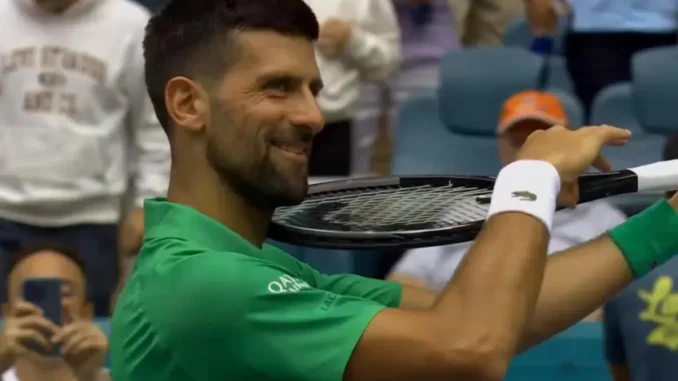
In the pantheon of tennis greatness, where legends are forged through sweat, resilience, and sheer brilliance, Novak Djokovic has once again etched his name in gold. On April 5, 2025, the Serbian maestro added another chapter to his storied career, surpassing the towering legacies of Rafael Nadal and Roger Federer with a record-breaking achievement at the Miami Open. At 37 years and 10 months, Djokovic became the oldest player ever to reach a Masters 1000 semifinal, eclipsing a mark previously set by Federer and cementing his place as a timeless force in the sport. This milestone, achieved with a hard-fought victory over Sebastian Korda, is more than just a number—it’s a testament to a career that continues to defy the odds and rewrite the history books.
The match itself was a showcase of Djokovic’s enduring prowess. Facing the American Korda in the Miami quarterfinals, he navigated a tricky 6-3, 7-6(4) win, blending precision with the mental toughness that has defined his game for two decades. “I’m honored to have another milestone, another record broken,” he said afterward, his voice carrying the weight of a man who knows every match now adds to an unparalleled legacy. This victory wasn’t just about advancing to the semifinals; it pushed his Masters 1000 match wins to 413, leaving Nadal’s 410 in the dust and further solidifying his dominance at this elite level. As he prepares to face Grigor Dimitrov next, the tennis world watches in awe, wondering how much higher this mountain of achievements can climb.
Djokovic’s journey to this point is a saga of relentless ambition. With 24 Grand Slam titles—more than Nadal’s 22 and Federer’s 20—he already holds the men’s record, a haul that includes a record 10 Australian Open crowns. His resume boasts 40 Masters 1000 titles, seven year-end championships, and an Olympic gold medal from Paris 2024, making him the only man to complete the Career Golden Slam and the Career Super Slam. “There’s always something on the line pretty much every time I play,” he reflected, a nod to the stakes that fuel his fire. Unlike Nadal, the clay-court king, or Federer, the grass-court artist, Djokovic has conquered all surfaces, holding all four majors simultaneously across hard, clay, and grass—a feat unmatched in tennis history.
This latest triumph in Miami carries extra weight when viewed against his rivals’ trajectories. Federer, who retired in 2022, was 37 years and 7 months when he last reached a Masters 1000 semifinal in Miami in 2019, a title he went on to win. Nadal, now 38 and set to bid farewell at the Davis Cup Finals in November 2025, has been sidelined by injuries, his last Masters 1000 win coming in 2022. Djokovic, though, keeps pushing forward, his body and mind defying the wear of nearly 20 years at the top. “Great serving when I needed to,” he said of his Korda match, a understated summary of the clutch performance that has kept him ahead of the pack.
The numbers tell a story of supremacy, but the narrative is richer than stats alone. Djokovic’s rivalries with Nadal and Federer—two of the sport’s most beloved icons—have shaped his career and the modern game. He leads their head-to-heads, 31-29 against Nadal and 27-23 against Federer, and is the only player to beat both at all four majors. “They are the reason I am where I am today,” he once said of his Big Three counterparts, acknowledging how their battles forged his greatness. Yet, while Federer’s elegance and Nadal’s tenacity won hearts globally, Djokovic has often played the outsider, his steely resolve earning respect over adoration.
As he eyes a record seventh Miami title—and his 100th career trophy—Djokovic’s legacy looms larger than ever. At 37, he’s not just outlasting his peers; he’s outshining them, breaking records they once held sacred. The tennis landscape has shifted—2024 was the first year since 2002 without a Grand Slam from the Big Three, with Carlos Alcaraz and Jannik Sinner stepping up—but Djokovic remains the last titan standing. His Miami run, already at 49-7 lifetime, is a reminder that age is just a number when you’re rewriting history one match at a time. For Nadal and Federer, the books are closed; for Djokovic, the pen keeps moving, leaving an indelible mark on a sport he refuses to let go of.
Leave a Reply